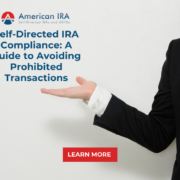Early Distribution from Your Self-Directed IRA
Life happens. A big expense you had not planned comes along, and you need more money than is readily available. It could be a job loss, major medical expense, tuition, or mounting interest charges adding to a large debt. While it may be a temporary need, borrowing the money with interest charges and a payback program may not be a viable solution either. This is where a Self-Directed IRA may come into play.
Depending upon your circumstances, your IRA or Self-Directed IRA could provide the help you need, although there are several important points to consider before making your important decisions.
Taking funds or assets from your Self-Directed IRA (or qualified plan) is known as a Distribution. When taken prior to age 59 1/2 it becomes an “Early Distribution”. (There is an RMD, which stands for Required Minimum Distribution, which you must take on a yearly basis once you reach age 70 1/2 which only applies to a Traditional IRA and not a Self-Directed Roth IRA.)
If you elect to take an Early Distribution, the IRS implements a 10% early distribution tax (except for a Roth IRA which has different rules). In addition, the IRS classifies your withdrawn amount as income. This means that you would be responsible for paying tax on the full amount distributed (in addition to the 10% early distribution tax) from a Traditional IRA or Self-Directed SEP IRA. For those over age 59 1/2, the amount is still considered taxable income, although you would not be subject to the 10% Early Distribution cost.
There are several exceptions allowed by the IRS on the 10% Early Distribution penalty. We suggest you verify with the IRS or a tax professional.
One exception is for a Self-Directed Roth IRA, which has been open for a minimum of five years, from which you are eligible to distribute any of your original contributions tax free and without any penalties.
Other possible exceptions include certain medical related circumstances. This includes if you have unreimbursed medical expenses which are at least 7.5% of your adjusted gross income if you are under the age of 65 (at which it becomes 10% of adjusted gross income) or become totally and permanently disabled. Exceptions also apply if the amount is not more than the cost of your medical insurance due to unemployment.
Non-medical exceptions could include if you are using the distribution(s) to buy or build a first home, if the distributions are less than your qualified higher education expenses, or if you have a Self-Directed Inherited IRA as beneficiary of a deceased Self-Directed IRA owner.
Please keep in mind that any tax penalties you may incur are imposed directly from the IRS and not through your Self-Directed IRA administrator or custodian. This is another reason why you need to be aware of any and all exceptions prior to the actual distribution of funds. The administrator or custodian has the responsibility of reporting an Early Distribution to the IRS, which will then issue you a 1099R form for any and all taxable amount(s).
When requesting a distribution specifically from your Self-Directed IRA, you begin by completing a Distribution Form. Accuracy is of the utmost importance so as not to cause a delay in receiving the funds you need.
One question that comes up is whether or not needing the funds on a short-term basis has an impact on your cost. The answer depends on how short of a term you need, with the magic number being 60 days. If you are able to replace your Distribution funds in full within 60 days of the effective date of the original distribution, the IRS would consider this a “Rollover”. You would not be subjected to the entire tax amount. Depending upon the circumstances and type of Self-Directed IRA involved, you may not be subject to any taxes under this 60-day circumstance. (Your tax professional can advise.) The IRS does allow individuals to complete one rollover every 12 months.
This scenario could be helpful to you in the event of expecting a tax refund, inheritance, or legal settlement within 60 days, but needing funds prior to its arrival.
Overall, it is wise to compare all of the options available to you when faced with a financial challenge. This information gives you the ability to compare your cost of a distribution against a conventional loan, credit cards with low interest rates, a home equity loan, or other possibilities available to you.
Be sure to have all of the facts before you make your final decision.
Interested in learning more about Self-Directed IRAs? Contact American IRA, LLC at 866-7500-IRA (472) for a free consultation. Download our free guides or visit us online at www.AmericanIRA.com.




